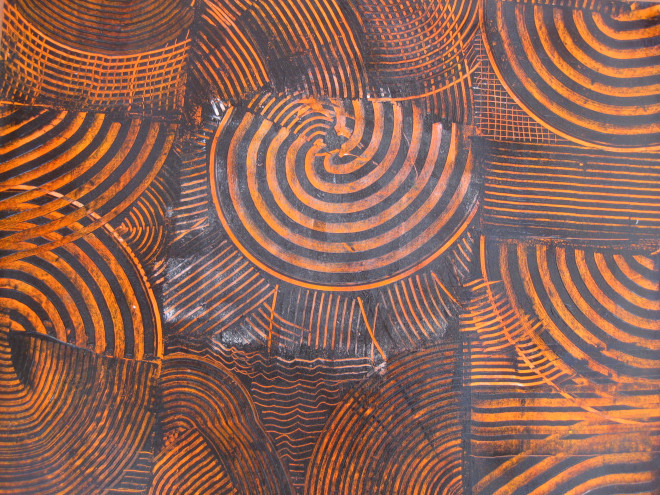Using Social Philosophy for Change

Image above: By Guillermo Díaz © ATD Fourth World
This article is based on a talk by Nathalie Bénézet during the Joseph Wresinski Foundation event at the Institut de France in Paris on March 7, 2023. It is part of our series from ATD Fourth World’s Social Philosophy Project.

This article is part of our Social Philosophy Series – Poverty, Social Criticism and Merging Knowledge.
Overcoming epistemic injustices
After more than three years of collaboration, ATD’s social philosophy project culminated last December with a conference at the University of Paris-Cité. It brought together ATD Fourth World activists, allies, Volunteer Corps members and philosophers. All were considered as co-researchers.
This project focused on three key aspects: rights, resistance, and epistemic injustice. For each of us, these words had different meanings. Although the group’s working language was French, other languages were also influential. With participants hailing from different parts of the world and those from France coming from diverse backgrounds, we had to overcome issues related to communication. Participants needed to use clear and understandable language without their words losing meaning or style.
So to have the right conditions to prevent epistemic injustice, we ensured that everyone felt respected and could openly express themselves. We also wanted group members to avoid feeling “less than” or sidelined because of their educational background or skill set.
Blending our knowledge
Our challenge was producing a body of work with input from everyone’s life experiences. We did this by writing together, intermingling our jargon and words, and ensuring we understood each other. “I will not put my name on a text I do not completely believe in. I have a responsibility towards the community I come from,” said one Fourth World activist with a lived experience of poverty. This did not mean the text had to be written precisely as everyone wanted; it would have been impossible. Therefore, the co-writing went from agreement, rejection, consent, multiple detours, disagreements, unexpected breakthroughs, and shared jubilation. We had to weave our expressions and words together–blending our knowledge. We had to forge a new way of highlighting the experiences of others.
My group tackled the theme of resistance. At first, we didn’t understand each other. Philosophers and some practitioners saw the daily struggle to “get by”, –the perseverance it can take to accomplish this–and resistance to the domination by society and institutions (even those meant to help them) as two separate entities1. The co-researchers in my group, with a lived experience of poverty, were shocked by this thinking. It was as if their perseverance to put food on the table or a roof over their heads only took place in a vacuum and had nothing to do with politics. It took a lot of work together for us to unravel all this.
Resistance everywhere
Carine de Boubers, a co-researcher with an experience of poverty, explained, “When you live in poverty, you resist those who think they are superior to you–those who, because of their presumed superiority, dictate how you should live. Just like standing up to other injustices one might face, people can also be resistant by living their lives and persevering. They can challenge circumstances and break the cycle of misfortunes that never seem to cease–it’s a life without mercy. Resistance is everywhere in life and is not a matter of choice. This doesn’t mean there aren’t strategies you can use. But resistance has a very high physical, psychological and social cost, and we aspire to live differently, no longer always having to resist life’s hardships endlessly”.
While reading Barbara Cassin’s (who also took part in the March 7 event at the Institut de France) text, I was very interested in the term Pantoporos aporos which she translates as “finding a way where there is no way”. This is precisely the experience of those in poverty. They cannot avoid what happens, so they are constantly forced to find a way where there is no way. This perseverance involves an element of creation and invention. ATD Fourth World grew from the same type of methodology. We work together with those in extreme poverty, trying to find new ways to rid society of the perceived notions that still exist today– that some lives are worth living more than others. Finding ways together to overcome obstacles and demonstrate that we are all part of the same humanity, for me, is what ATD’s social philosophy project was about.
A book based on the project writings will be published by Bord de l’eau publishing house at the end of the year, and it is at this time, we will require support for its distribution. Spaces and opportunities to promote the book will also be necessary for the co-authors to share their experiences. All the co-authors are on a life path that intersects, and sharing their experiences with the broader public offers a means for personal growth.
- To understand this concept, it must be understood that both of these concepts can be seen as a resistance to power. The first form of the definition of power can be seen as the ability to act, which opens up a path to creativity, possibility and invention (perseverance). The other definition of power is the power of someone over someone else (such as political institutions). All of these powers give rise to resistance.

